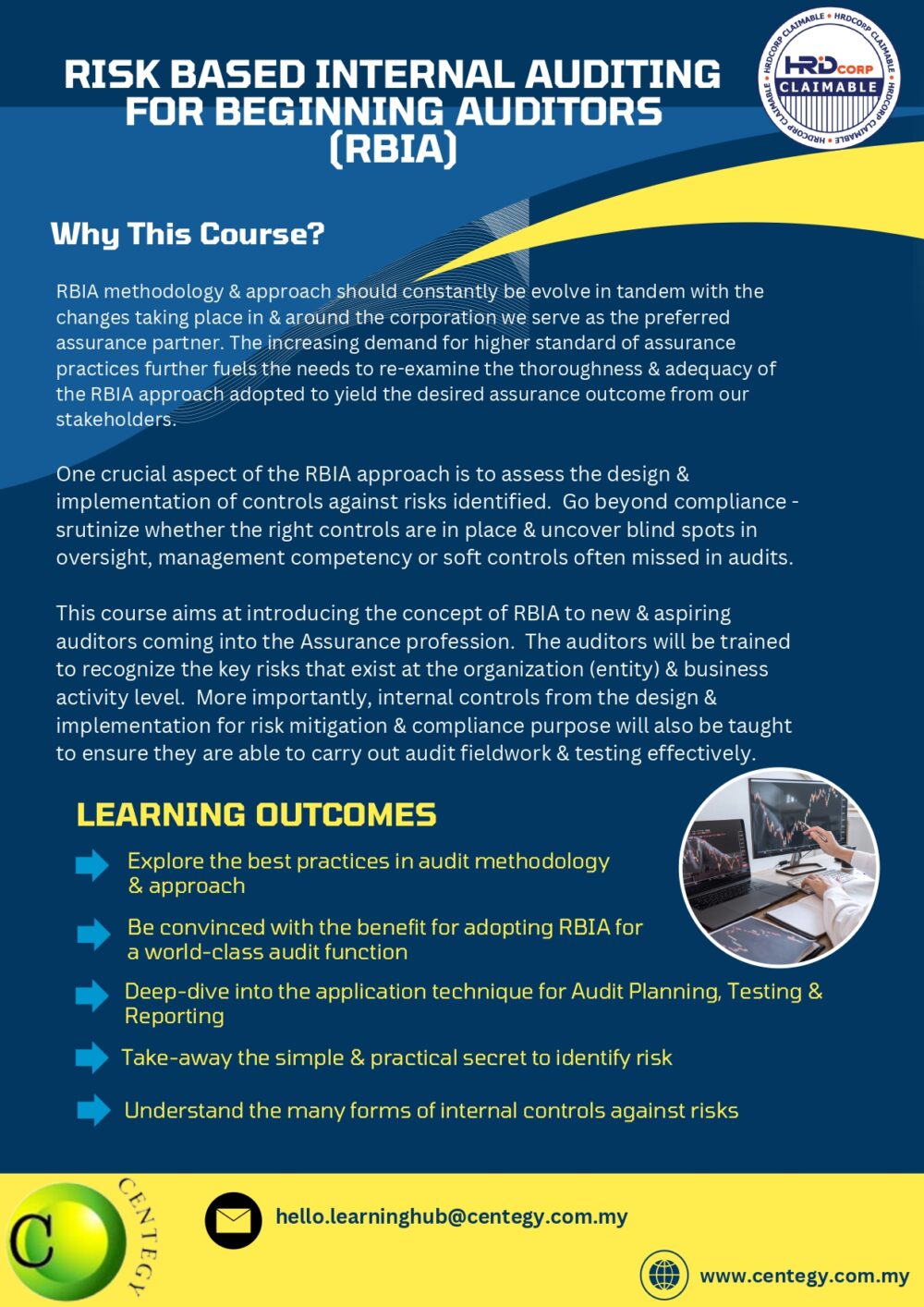Why This Course?
RBIA methodology and approach should constantly evolve in tandem with the changes taking place in and around the corporation we serve as the preferred assurance partner. The increasing demand for higher standard of assurance practices further fuel the needs to re-examine the thoroughness and adequacy of the RBIA approach adopted to yield the desired assurance outcome from our stakeholders.
One crucial aspect of the RBIA approach is to assess the design and implementation of controls against risks identified. In this regard, the challenge remains whether the right controls are being identified and scrutinized. Could there be any blind-spots in the effectiveness of oversight, competency of management, change management practices or other soft controls that were not adequately reviewed or reported?
This course aims at introducing the concept of RBIA to new and aspiring auditors coming into the Assurance profession. The auditors will be trained to recognize key risks that exist at the organizational (entity) and business activity level. More importantly, internal controls from the design and implementation for risk mitigation and compliance purposes will also be taught to ensure they are able to carry out audit fieldwork and testing effectively.
Curriculum
- Introduction to RBIA: The Concept of RBIA & Traditional and Compliance Audit versus RBIA
- IIA’s Position on RBIA
- Embracing RBIA : 5 Compelling Reasons for Adopting RBIA
- Fitting RBIA Methodology into the Larger Picture of Assurance Today
- Case Illustration: Risk-based Thinking in Real Corporate Situations
- Issues and Challenges in Adopting RBIA Approach
- Knowing the Difference between RBIA VS Enterprise Risk Management (ERM)
- Overview and Phases of the RBIA Methodology: Audit Planning and Engagement Planning; Audit Fieldwork & Audit Reporting
- Having The End Product/ Deliverable in Mind : The AAP
- What is AAP? & What is ORC? Recording of ORC using Risk and Control Matrix (RCM)
- Risk Defined: Scoring of Risks (Likelihood and Impact)
- Inherent and Residual Risk Identification
- Vital Risk Assessment Approach and Technique & Prioritizing Area of Focus in AAP
- What is EP? Key EP Performing Steps & Deliverables
- RBA: Audit Fieldwork: The Purpose & Having The End in Mind for Audit Fieldwork Phase : Audit Testing & Evidence Review and Recording
- Opening Meeting: Sharing of ORC and Audit Concerns & Approach
- Audit Evidence (IPPF Guidance)
- Completion of RCM and Controls Gap Identification
- Concept of Audit Sampling and Testing Approach
- Closing Meeting: Sharing of Assurance’s View in relation to the Business and Governance Practices
- RBA: Audit Reporting: The Purpose & Having The End in Mind for Audit Reporting Phase: The Balanced Audit Reporting and Report
- Meaning of Audit Finding and Audit Issue
- Key Business and Governance Related Concerns/ Considerations
- Develop Impactful and Value Adding Audit Issues
- Root Cause: Definition and Approach to Identify Root Cause
- Risk and Impact: Quantifying and Justifying Audit Issues to Convince The Board Audit Committee, Management/ Process Owners
- Rendering Effective Audit Recommendation and Solution
Learning Outcomes
Explore the best practices in audit methodology and approach
Be convinced with the benefits for adopting RBIA for a world-class audit function
Take-away the simple and practical secret to identify risk
Deep-dive into the application technique for Audit Planning ,Testing and Reporting
Understand the many forms of internal controls against risks
Modes of Learning
In Person
Coming Soon
- Face-to-face Learning : including case studies and Q&A session
- Reading Materials
- Learning reinforcement : for individual modules
- Quizzes and Tests
- Summary report : for quizzes and tests (post-course
- Course Completion Certificate
Webinar
Coming Soon
- Live Webinar Session : including case studies and Q&A session
- Reading Materials : pre-course
- Learning reinforcement : for individual modules
- Quizzes and tests : post-course
- Summary report : for quizzes and tests (post-course)
- Course Completion Certification
*There will be short breaks and lunch allocated at appropriate intervals
Professional. Insightful. Trusted.
Discover the professional background and core strengths behind our training approach.



